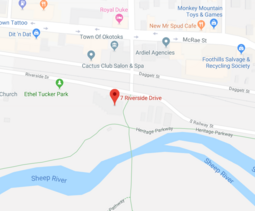OPL Seed Library
Thanks to a generous anonymous donation the Okotoks Public Library is excited to launch our very first Seed Library!
The OPL Seed Library will be open March 15th to October 31st.
What is a seed library?
Like traditional library services, a seed library provides access to a resource. Library users are able to borrow seeds for their own garden! A seed library is a collection of seeds that can be “borrowed” with the goal of educating library users about agricultural initiatives and promote environmental-friendly practices. As users learn about seed saving, they return the seeds from their crops to the seed library for others to use.
How does the seed library work?
1. Seeds are organized first into categories (vegetable, fruit, herb, etc.) and then by common name.
2. Library users will borrow seeds they want to garden.
3. Library users are encouraged to bring back seeds from their grown crop to share with other community members.
How many seed packets can I borrow?
You can borrow up to two seed packets per household, per day.
What is Xeriscaping?
Xeriscaping is a type of landscaping that places a priority on water conservation. Plants that respond well to Xeriscaping include:
- Calendula (flower)
- Nasturtium (flower)
- Poppy (flower)
- Sunflower (flower)
- Zinna (flower)
- Chives
- Thyme
See West Coast Seeds’ page on Xeriscaping for more information.
What type of seeds can I donate?
We will accept herb, fruit, vegetable and flower seeds. We will not accept any seeds that are considered invasive by the Alberta Invasive Species Council. We also will not accept any seeds of highly aggressive plants including goutweed, lily of the valley, bugleweed, etc.
At the moment, the library is only accepting donations of store-bought seed packets in their original packaging. We will begin accepting donations of harvested seeds on September 1st, 2024.
How do I harvest seeds?
From West Coast Seeds’ Seed Saving Instructions:
“When you collect your own seed you need to work with nature and watch plants daily in order to catch the ripe seed before the wind whisks it away or the plant releases it to the soil.
How do you know when the seed is ripe and ready to collect? If the seed comes away in your hand, it is ready to collect. If the seed is in a pod or a capsule, watch for the first pod to split and then collect the remaining pods, place in a paper bag, and store in a cool dry place to let the seeds finish ripening. You can also collect the whole seed-head and leave them to dry until the seeds can be separated–then simply shake or cut seeds into paper bags. Tall stems can be cut and bundled, the heads placed in a paper bag with the neck tied and then hung upside down by the stems in a cool dry place. As the heads dry, many of the seeds will fall into the bag. Drying time ranges from one week to one month.
Collected seeds need to be completely dry to prevent rot and fungal disease and to help separate the seed from surrounding material which can be broken up easily when the seed is dry. The best way to dry seeds is to place them in a thin layer in open containers in a dry well-ventilated room. High temperatures may damage the embryo, thus reducing germination, so do not use the greenhouse for drying.
Next, clean your seeds to improve germination. Material surrounding the seed needs to be removed to expose the seed itself. In some cases, this requires patience, tweezers, and a sieve. Store seeds in small envelopes or mason jars. Most seeds should last for at least 12 months under good conditions. Remember to label all seeds as soon as you have collected them.”
I've harvested my seeds - how do I donate them back to the Seed Library?
Please fill out our short donation sheet, which can be picked up at the Library or printed out:
Seeds can be returned in a small envelope or clean ziploc bag, along with the donation sheet. Please drop seeds off at the front desk in the Library.
Some important notes to keep in mind when harvesting seeds for donation to the OPL seed library:
- Seeds should be harvested from healthy plants only, for disease resistance
- Seeds must be clean and dry
- Plants that seeds are harvested from should follow their recommended isolation distance and should be planted one variety per family in the garden
- Please donate seeds that were harvested within the past 2 years, as older seeds may not grow
Useful Links
Farmer’s Almanac Planting Calendar, by postal code
Farmer’s Almanac Plant Growing Guides
McKenzie Seeds How to Grow Guides
Westcoast Seeds, Articles and Instructions
Thanks to West Coast Seeds and McKenzie Seeds for donating seeds to get our lending library started!


